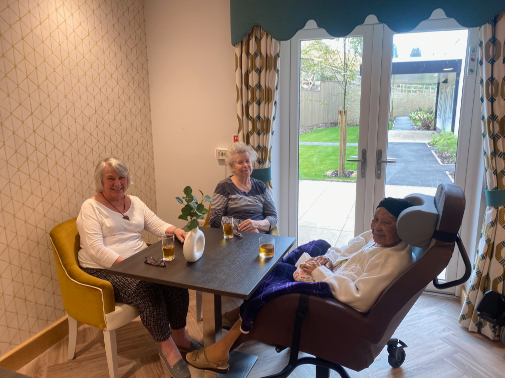What Are Care Plans in Care Homes?

Before someone moves into a care home for residential, nursing, dementia or respite care, the team will create a care plan that will stay with them for their whole journey. But what is a care plan, and why is it such a key component of high-quality care?
In this blog, we explore what care plans are, how they contribute to providing a continuum of care and why they are vital for achieving positive care outcomes for residents. Whether you’re considering care for yourself or a loved one, understanding the purpose and power of support planning can help you feel more confident about the transition into care.
What is a Care Plan?
A care plan is a comprehensive, detailed document that outlines how a person’s care needs should be met by the team who look after them. It will include information about their health conditions, medical conditions, dietary requirements, personal preferences, likes and dislikes, daily routines, and long-term goals.
These plans are created prior to the resident moving in with themselves and their loved ones, to ensure the support provided feels natural and aligned with their needs from the moment they move in.
What is a Person Centred Care Approach?
In a high-quality care setting, care plans are shaped using a person-centred care framework. This means they are designed around the individual, rather than expecting the individual to fit into a one-size-fits-all model. A person-centred approach recognises each person’s unique story, preferences, routines, and aspirations.
Instead of focusing only on clinical health and care services, person-centred care considers the whole person. The following questions could be considered for an individual when adopting a personalised approach to care to not only meet their medical needs but also support their mental and emotional well-being:
What makes them feel at home?
What do they enjoy doing?
What levels of support do they need to maintain their independence and quality of life?
What parts of their routine are vital to continue?
What are their short and long-term goals?
Who are their loved ones, and are they located nearby?
Do they require low-level or high-level assistance?
This collaborative approach is also one of the most effective ways to deliver care that truly enhances residents' quality of life.


What Does a Care Plan Include
Care planning begins when someone is preparing to move into a care home. A thorough assessment is carried out by trained healthcare professionals, such as nurses and senior care assistants within the home. This helps identify the person’s needs, existing conditions, and current hobbies, as well as their hopes for the future.
The process is open and respectful, involving the resident as much as possible. By encouraging them to be involved and make decisions about their own care, staff can better understand how to provide support that feels right for them. Care plans are then regularly reviewed and updated to reflect any changes in the person’s health, well-being or preferences.
Regularly reviewing care plans in care homes is particularly important for those living with long-term conditions such as dementia, where needs can evolve. They also ensure the care provided remains aligned with best practice and the latest guidance from healthcare services.
Why Are Care Plans in Care Homes So Important?
Effective care plans bring structure and clarity to the care being provided. They help teams manage the daily support for each resident while keeping sight of the bigger picture of maintaining positive health and wellbeing outcomes. For the residents themselves, these plans provide reassurance that their voice matters and their needs are understood.
Personalised care planning also ensures that care providers, whether this is nurses, carers or visiting healthcare professionals, all have access to the same accurate and up-to-date information. This means the care provided will be more consistent and promote better outcomes for the person receiving care.
Another benefit of a person-centred care plan is that it supports independence wherever possible and encourages residents to take an active role in their daily routine and decision-making. This also contributes to residents being able to consider the environment as a true home-away-from-home and enhances their quality of life.

Supporting Mental Health and Emotional Well-Being
While physical health is a core part of care planning, it is essential to also include mental health and emotional well-being. A good care plan will include activities and support that enable each resident to stay connected, maintain their confidence, and continue to do things that bring them joy and purpose.
A supportive care environment recognises that mental health is just as vital as physical health. By building this into the planning process, care homes can help people feel more settled, engaged, and positive about moving in.
Working in Partnership with Families and Professionals
Care planning is never carried out in isolation. It involves a wide network of support, including families, care providers, GPs, nurses and therapists. This partnership ensures the person receives consistent care and support that reflects all aspects of their life.
Incorporating family members into the care planning process provides them with peace of mind that their loved ones are being supported to the highest degree. Also, some residents may have a power of attorney assigned due to their health condition, so their insight is essential to help staff understand each person’s life story and how best to support them.
How Care Plans Evolve Over Time
As residents grow older, their care needs will develop, and their care plan must reflect this. Whether this includes a new diagnosis, a hospital admission, a change in mobility, or a shift in preferences, the care plan should be updated and communicated to the resident and their loved ones.
For those approaching the later stages of life, care planning may include discussions around end-of-life care. This sensitive part of the process is approached with compassion, ensuring the person’s wishes are known and respected. This type of planning gives individuals and families peace of mind and supports dignified, warm care right to the end.


Enjoy a Lifestyle Full of What You Love at Pottersway House
At Pottersway House Care Home in Church Lawton, we know that each of our residents is unique, so person-centred care is at the heart of everything we do. We strive to ensure our residents enjoy the highest quality of care and maintain as much independence as possible. Our team take the time to get to know our residents beyond their health conditions and become like an extended member of the family.
Whether someone receives residential care, dementia care, nursing care or respite care, our dedicated and compassionate team works in partnership with residents, families and healthcare providers to ensure the care provided is responsive and fully aligned with their preferences.
It is important to us that our residents continue with their favourite hobbies, so we have a variety of in-house facilities and amenities for them to use around the clock including a cafè, hair salon & treatment room, cinema and private gardens.
Come and Meet Our Friendly Team
To find out more about our luxury Church Lawton care home, book a tour. We can't wait to welcome you into our home and show you how we go above and beyond for our residents 24 hours a day, 7 days a week.






